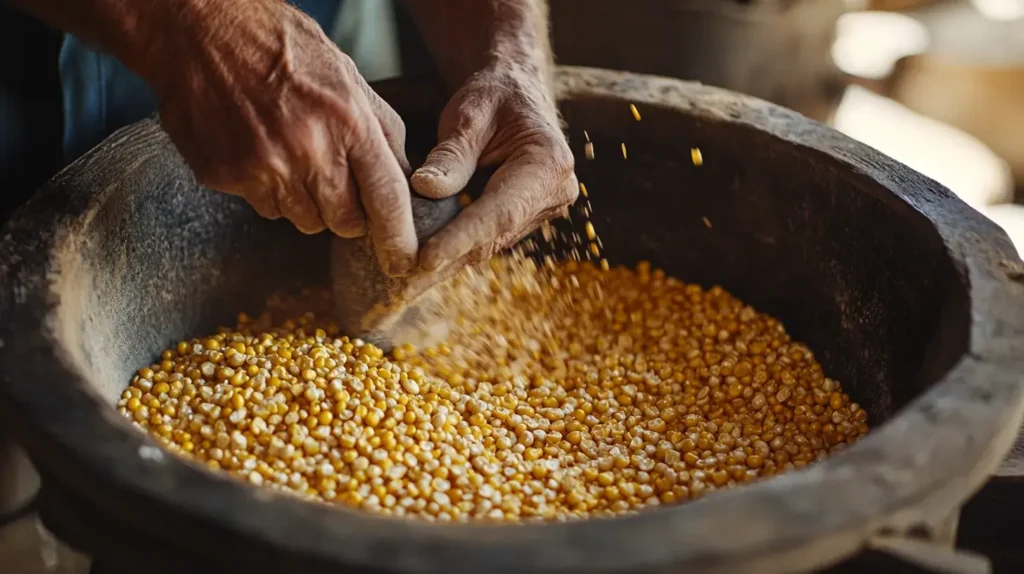Corn chips have become a popular snack around the world, but health-conscious consumers are increasingly concerned about their nutritional content. A major concern involves the presence of lectins in corn chips. Lectins, a type of protein found in many plant foods, can sometimes cause digestive discomfort and may have other health implications. So, are corn chips high in lectin? In this article, we’ll look into the science behind lectins, how they affect our health, and whether corn chips carry any significant risks because of their lectin content. Understanding the ingredients and preparation processes of corn chips will help us make informed decisions about including them in our diets.
Table of Contents
What Are Lectins?

The process of making corn chips includes several steps that reduce lectin levels. Are corn chips high in lectin? After harvesting, workers clean the corn kernels and grind them into fine meal. They then mix the meal with water and salt to form dough. In some cases, the dough undergoes nixtamalization, which lowers lectin content. Once they prepare the dough, they shape it into chips and fry it until crispy.
Lectins can attach to the intestines, leading to irritation in some cases. This is why many people with sensitive digestive systems should limit foods rich in lectins. To explore other snacks that minimize lectin content, consider alternatives like plantain chips, which are naturally lectin-free.
What Are Corn Chips Made Of?
To understand whether corn chips are high in lectin, we need to examine their composition. Corn chips primarily consist of corn, which undergoes a series of processing steps to become the crunchy snack we recognize. Although corn chips contain some lectins, their levels are relatively low, especially after processing. Most people can enjoy corn chips in moderation without any issues.
Understanding the Ingredients of Corn Chips
Corn chips typically contain cornmeal, oil, salt, and sometimes seasonings. Many commercial brands use pre-cooked or nixtamalized corn, which involves soaking and cooking the kernels in an alkaline solution. This process not only enhances flavor but also alters the composition of the corn, affecting its nutritional profile and potentially reducing lectin content.
When making corn chips, the basic ingredients undergo several stages: grinding, mixing with water, and frying. Are corn chips high in lectin? Nixtamalization, as mentioned earlier, reduces the levels of certain harmful substances, including lectins, by breaking down their structures. However, the exact degree to which this process reduces lectin levels in corn chips remains unclear.
Corn and Its Nutritional Composition
Corn is a rich source of carbohydrates, fiber, and essential nutrients like vitamin C, B vitamins, and magnesium. It also contains high levels of antioxidants, which contribute to its health benefits. However, like many other grains, corn contains lectins, especially in its raw form. Are corn chips high in lectin? Since corn is the main ingredient in corn chips, understanding its nutritional composition helps answer this question.
Raw corn kernels contain relatively high levels of lectins, but the levels decrease when the corn undergoes processes like cooking or soaking. Additionally, corn contains various proteins, including zein, a major protein in corn. While zein isn’t a lectin, it can contribute to allergic reactions in some individuals. Are corn chips high in lectin? When processed into corn chips, most of the lectins in corn may reduce, but it’s essential to consider the type of corn and the preparation methods.
Process of Making Corn Chips
Here’s the revised paragraph with the focus keyword included:
The process of making corn chips involves several steps that reduce lectin levels. After harvesting, workers clean the corn kernels and grind them into fine meal. They then mix the meal with water and salt to form dough. In some cases, the dough undergoes nixtamalization, which lowers lectin content. Are corn chips high in lectin? Once the dough is prepared, workers shape it into chips and fry it until crispy.

This high-heat frying process also helps break down some of the lectins in the final product. However, because corn chips are a processed food, their lectin content is harder to control compared to freshly prepared whole foods like vegetables or legumes. While processing can reduce the lectin content in corn chips, it might not eliminate it completely.
Nixtamalization, mentioned earlier, reduces harmful substances like lectins. Learn about ways to minimize lectins in processed snacks by understanding advanced cooking techniques.
Understanding Lectins and Their Role in the Diet
Lectins aren’t inherently harmful, but they can cause issues when consumed in excess. While researchers have studied lectins’ potential health effects, the overall impact of consuming foods high in lectins remains debated. Are corn chips high in lectin? To answer this question, we need to understand the role of lectins in our diet and how they may affect different individuals.
Types of Lectins in Foods
Many types of lectins exist, each found in specific foods. Some of the most common sources of lectins include beans, legumes, whole grains, and certain vegetables. Are corn chips high in lectin? People generally consider lectins anti-nutrients because they can interfere with the absorption of essential nutrients like calcium, iron, and zinc. However, cooking or soaking these foods can significantly reduce lectin content, making them safe to eat for most people.
Corn contains several types of lectins, including maize lectin, which is specific to the corn family. Are corn chips high in lectin? The levels of maize lectin in corn chips depend on the type of corn used and the processing methods employed. Generally, processing methods like nixtamalization reduce the lectin levels in corn chips.
Lectins and Their Effect on Human Health
Lectins have both beneficial and harmful effects on health. On one hand, lectins can act as antioxidants, helping fight oxidative stress in the body. Are corn chips high in lectin? On the other hand, when consumed in large quantities, they may lead to digestive issues like bloating, gas, and diarrhea. In some cases, lectins can disrupt the gut lining, leading to more serious conditions like leaky gut syndrome.
Are corn chips high in lectin? The amount of lectins in corn chips is relatively low compared to other high-lectin foods like beans and legumes. Still, consuming large amounts of corn chips could contribute to lectin-related issues, especially for individuals with sensitive digestive systems or those prone to autoimmune conditions.
Positive and Negative Effects of Lectins
Lectins’ effects vary depending on the individual and the specific type of lectin consumed. Some lectins may help regulate blood sugar levels, while others may support immune function. Are corn chips high in lectin? However, when consumed in large amounts, lectins can cause digestive distress and interfere with nutrient absorption.
When it comes to corn chips and lectins, the negative effects are generally less pronounced due to the cooking processes used during preparation. Nevertheless, some individuals may still be more sensitive to lectins than others. For those interested in broader dietary insights, check out the connection between lectins and common foods.
Corn and Lectins: What’s the Connection?
Now that we have a better understanding of lectins and their impact on health, let’s look at the connection between corn and lectins in the context of corn chips.
Levels of Lectins in Corn
The levels of lectins in corn vary depending on the type of corn used and how it’s processed. For example, fresh, raw corn contains relatively high levels of lectins, particularly in the outer layers of the kernel. However, when the corn undergoes processing to become corn chips, cooking, soaking, or nixtamalization breaks down some of the lectins. This makes corn chips less likely to contain high levels of lectins compared to raw corn products like corn on the cob or raw cornmeal.
Are Corn Chips Considered High in Lectins?
Considering the processing methods and the relatively low lectin content in corn chips, they aren’t generally considered high in lectins. However, for individuals with sensitive digestive systems or those following a lectin-free diet, consuming corn chips may still cause mild discomfort.
In general, the lectins in corn chips are minimal and unlikely to harm most people when consumed in moderation. However, it’s always a good idea to be cautious if you have concerns about lectin consumption.
How to Reduce Lectins in Corn Chips
If you’re concerned about the lectin content in corn chips, there are a few methods to reduce the amount of lectins in your snack.

Cooking and Processing Methods
One of the best ways to reduce lectin levels in corn chips is through proper cooking techniques. As mentioned earlier, the nixtamalization process is highly effective at breaking down lectins. Additionally, frying corn chips at high temperatures can also help reduce lectin content. These methods are commonly used in commercial corn chip production and make corn chips a safer option for most consumers.
The Role of Fermentation and Soaking
Fermentation and soaking are other effective methods for reducing lectin levels. Soaking corn kernels in water for several hours can help reduce lectin content before cooking. Fermentation also naturally breaks down lectins and other anti-nutrients, improving the digestibility of corn-based foods. While these methods may not be practical for homemade corn chips, they are often used for preparing other corn-based dishes like tortillas and cornmeal.
Are Corn Chips Safe to Eat Despite Lectins?
For most people, corn chips are safe to eat, even though they contain lectins. The low levels of lectins in most commercially available corn chips make them a reasonable choice for snack foods, especially when consumed in moderation.
Corn Chips and Digestive Health
Corn chips are generally well-tolerated by most individuals, but those with digestive sensitivities may experience some discomfort. Since the lectins in corn chips are significantly reduced during processing, they are less likely to cause digestive issues compared to raw or undercooked corn. However, for individuals with conditions like IBS or leaky gut syndrome, it may be beneficial to avoid high-lectin foods altogether, including corn chips.
Balancing Lectin Consumption in the Diet
If you’re concerned about lectins, it’s essential to balance your overall diet by including a variety of foods and focusing on proper cooking and soaking methods to reduce lectin content. Consuming a diverse range of foods, including fruits, vegetables, and lean proteins, can help ensure that you’re not overly reliant on lectin-containing foods.
Alternative Snacks with Lower Lectin Content
If you’re looking to reduce your lectin intake, there are plenty of delicious and nutritious snack options available. Lectins are proteins found in many plants that can interfere with nutrient absorption and cause digestive issues for some individuals. Here are some alternative snacks that are lower in lectin content:
1. Nuts and Seeds
Nuts and seeds are excellent choices for a quick snack. They are not only low in lectins but also packed with healthy fats, protein, and fiber. Some great options include:
- Almonds: Rich in vitamin E and magnesium, almonds make for a satisfying and crunchy snack.
- Sunflower Seeds: These seeds are high in healthy fats and contain important nutrients like selenium, which supports immune function.
2. Vegetable Chips
Instead of traditional potato chips, try making your own vegetable chips. They can be made from a variety of vegetables, such as:
- Sweet Potatoes: Naturally sweet and rich in beta-carotene, sweet potato chips are a tasty alternative.
- Zucchini: Thinly sliced and baked, zucchini chips are low in calories and high in nutrients.
- Carrots: Carrot chips provide a satisfying crunch and are loaded with vitamins and antioxidants.
3. Rice Cakes
Rice cakes are a versatile snack that can be enjoyed on their own or topped with various spreads. Opt for rice cakes made from white rice, which are lower in lectins compared to whole grains. You can try:
- Plain Rice Cakes: Light and airy, they can be enjoyed with a sprinkle of salt or as a base for toppings.
- Topped Rice Cakes: Spread with nut butter or avocado for added flavor and nutrition.
4. Dairy Options
Dairy products can be a great source of protein and probiotics, which are beneficial for gut health. Consider these options that are lower in lectins:
- Cheese: Hard cheeses, such as cheddar or parmesan, have minimal lectin content and are rich in calcium.
- Yogurt: Look for plain, unsweetened yogurt that contains live cultures to boost your gut health while keeping lectin levels low.
5. Additional Suggestions
In addition to the snacks mentioned above, here are a few more ideas to consider:
- Olives: Packed with healthy fats and antioxidants, olives are a flavorful and low-lectin snack.
- Jerky: Look for grass-fed beef or turkey jerky that is free from added sugars and preservatives.
- Hard-Boiled Eggs: A protein-rich snack that is easy to prepare and very filling.
These alternatives can suit individuals who want to enjoy snacks without the potential negative effects of high lectin content, such as those wondering, “Are corn chips high in lectin?” Incorporating these options into your diet not only helps in reducing lectins but also promotes overall health and well-being. Enjoy experimenting with these snacks to find your favorites while still wishing to minimize their lectin consumption!
FAQs on Lectins in Corn Products
Do all corn products contain lectins?
Yes, most corn products contain some level of lectins, though the amounts can vary significantly based on how the corn is processed. Cooking and soaking methods can significantly reduce lectin levels in corn, making it safer for consumption.
Can soaking corn reduce lectin levels?
Absolutely! Soaking corn can help reduce its lectin content. This method is particularly effective when preparing whole kernels or cornmeal for cooking, as it allows the lectins to leach into the soaking water.
Are there health risks associated with consuming lectins in corn chips?
For most people, consuming corn chips in moderation is generally safe. However, individuals with digestive issues or lectin sensitivity may experience mild discomfort or digestive distress from consuming high-lectin foods, including corn chips.
Can lectins in corn chips cause food allergies?
Lectins themselves aren’t typically responsible for food allergies. However, individuals with a sensitivity to corn or other ingredients in corn chips may experience allergic reactions. For those with known allergies, it’s crucial to read ingredient labels carefully.
What is the best way to reduce lectin intake in a diet?
To effectively reduce lectin intake, focus on proper cooking methods, such as:
- Soaking: Soaking beans, grains, and legumes before cooking can help reduce their lectin content.
- Fermenting: Fermentation can break down lectins, making foods easier to digest.
- Cooking at High Temperatures: Cooking foods at high temperatures can significantly reduce lectin levels.
Additionally, opting for low-lectin foods like certain fruits, vegetables, and animal products can further help manage lectin intake.
Are there other foods with high lectin levels similar to corn?
Yes, several other foods are known for their high lectin content, including:
- Beans and Legumes: These are particularly high in lectins and should be prepared properly to reduce their levels.
- Certain Grains: Wheat, barley, and oats also contain significant amounts of lectins.
- Nightshade Vegetables: Some individuals may be sensitive to lectins found in nightshade vegetables like tomatoes and eggplants.
By being mindful of these foods and employing proper cooking techniques, you can better manage your lectin intake while enjoying a varied diet.
Conclusion
Are corn chips high in lectin? While corn chips contain some lectins, the levels remain relatively low compared to other foods, particularly after undergoing processing. Most people can safely eat corn chips in moderation without experiencing any issues. However, individuals with sensitive digestive systems or those following specific dietary restrictions may need to be more cautious when consuming corn chips. Lectins, while not harmful in small amounts, can cause discomfort for some people and may lead to digestive issues.
By understanding the role of lectins in our health and how they interact with our digestive system, we can make better choices about which snacks to include in our diets. Are corn chips high in lectin? Additionally, using cooking and processing methods, such as nixtamalization, that reduce lectin content in corn chips can further minimize any potential negative effects.

